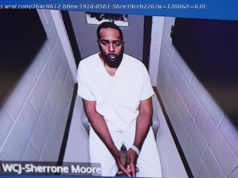A criminal complaint filed Friday charges a Russian national, employed by a firm linked to Vladimir Putin and Russian intelligence, with helping direct interference in the 2018 midterm elections.
The Russian conspirators waging an ongoing disinformation and propaganda campaign targeting American voters directed their trolls on social media to call the late Arizona Senator John McCain an “old geezer,” and Special Counsel Robert Mueller “a puppet of the establishment.” President Trump, the trolls were told to say, “deserves a Nobel Peace Prize” for meeting with North Korean leader Kim Jong Un.
Those are just a few of the messages that Russian trolls were tasked with spreading on Facebook, Twitter and Instagram between 2016 and 2018 to sow discord and influence U. S. elections, according to a criminal complaint unsealed on Friday.
The complaint was filed by the Justice Department in the eastern district of Virginia against Elena Khusyaynova, a 44-year-old Russian national who allegedly managed the finances of an election interference campaign run out of the Internet Research Agency in St. Petersburg, code-named Project Lakhta. The complaint makes Khusyaynova the first Russia charged with interfering in the 2018 midterm elections.
The messaging strategy mimicked the overheated rhetoric that the St. Petersburg firm, financed by an ally of Russian President Vladimir Putin and closely tied to Russian intelligence, employed to considerable effect during the 2016 presidential election. The partisan —and, at times, hateful—comments so artfully mimicked the daily back and forth on social media that they seemed to be those of real Americans. The rhetoric wasn’t necessarily sophisticated, but it did reveal a basic understanding of U. S. culture wars. At times, the messaging copied President Trump’s bombast, almost verbatim.
The complaint says the Russian conspirators directed their army of trolls to “[s]tate that during past elections, namely, this mainstream media, which supported Hillary Clinton’s candidacy, disseminated fake news,” with a citation to one such article from CNN. (One of Trump’s favorite refrains, chanted by his supporters at rallies, is that “CNN is fake news.”) Another troll was allegedly instructed: “Brand Paul Ryan a complete and absolute nobody incapable of any decisiveness” because of his opposition to Trump’s immigration cuts. (Trump called Ryan a “weak and ineffective leader” in 2016.) Yet another Russian troll was allegedly told to produce an article about voter registration numbers in California that should refer to “large-scale falsifications” that threaten to turn the Constitution “into a mockery and celebration of lawlessness…there is an urgent need to introduce voter IDs for all the states.” (Trump has claimed, without evidence, that between three and five million ballots were cast illegally in the 2016 election.) The Russians went after Mueller, too, according to the complaint, urging troll factory employees to portray the man investigating Trump as “a politician with proven connections to the Democratic party” who is incapable of producing “honest and open results.” (Trump has attacked Mueller “and his whole group of angry Democrat thugs,” calling his investigation a rigged “witch hunt.”)
The echo chamber between Trump’s election rhetoric and that of the Russian trolls was striking.
Russia’s use of phony social media accounts p to spread disinformation and propaganda on social media in the run-up to the 2016 election was heavily scrutinized following Facebook’s disclosure last September that it had shut down 470 pages linked to the Internet Research Agency that shared divisive content and then promoted it using targeted political ads. Approximately 10 million people saw the ads, Facebook estimated, which targeted users in Michigan and Wisconsin—two states Trump won by approximately 10,000 votes and 22,000 votes, respectively. Twitter told Congress in November that Russia-linked accounts “generated approximately 1.4 million automated, election-related tweets, which collectively received approximately 288 million impressions” last year from September 1 to November 15.
The disinformation campaign—which was bolstered by the Russians’ hack on the Democratic National Committee and Hillary Clinton’s campaign chairman during the 2016 election—was described by Mueller in detail in February, when he indicted 13 Russian nationals, including Khusyaynova’s alleged employer, Putin confidant Yevgeny Prigozin.
The Russians used PayPal accounts and utilized a complex network of shell companies to finance the operation, Deputy Attorney General Rod Rosenstein said earlier this year, following Mueller’s indictment. The troll factory’s budget for the project, which Khusyaynova allegedly controlled, exceeded 73 million Russian rubles—or roughly $1.2 million—per month. If anyone expected Project Lakhta to shut down after the 2016 election, however, they would have been wrong: the troll factory’s budget actually grew almost monthly between January and June 2018 as the Russian trolls targeted the midterms, according to the complaint. By July, the proposed operating budget totaled more than $10 million.
That month, Mueller issued yet another indictment laying out in extraordinary detail how Russia’s military intelligence agency hacked Democratic organizations and timed the release of the stolen material to have the maximum impact on the election. Three days later, Trump stood on stage with Putin in Helsinki, Finland, and again refused to condemn him for Russia’s interference campaign, even going so far as to deny the conclusion of U. S. intelligence agencies that Russia was responsible. “I think we have both been foolish,” Trump said, when asked by a reporter whether he would hold Russia accountable “at all, for anything in particular.” He added: “I think we are all to blame.” Asked later whether he would denounce Russian interference and ask Putin to never do it again, Trump said he didn’t “see any reason why it would be Russia” that interfered.
Trump’s critics, and even some members of his own party, were stunned by the president’s refusal to hold Putin accountable for Russia’s election meddling. “I’ve seen Russian intelligence manipulate many people in my career,” GOP Congressman Will Hurd, a former CIA official, told CNN at the time.






